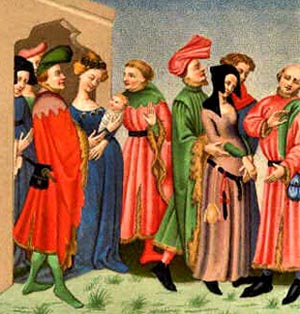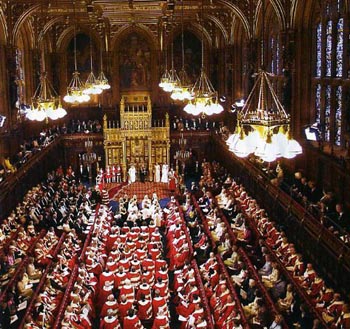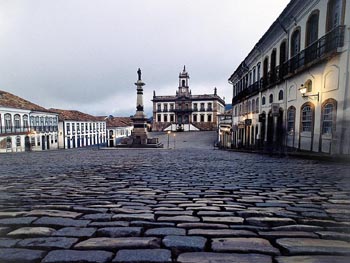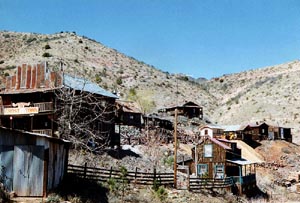 |
Organic Society
Natural & Unnatural Decline of the Clan
Plinio Corrêa de Oliveira
The clan is a living entity. So, either qualitatively or quantitatively, it is always producing more. Following the designs of Divine Providence, a healthy clan produces leaders. Doing so, it generates its own force of propulsion.

A medieval clan full of vitality |
Like every authentic authority, the authority of a clan does not force an orientation that no one wants, or oblige everyone to follow such a path. This is not a characteristic of an authentic authority. The chief of the clan is the one who knows all the legitimate appetencies of its members and satisfies them in an orderly way that helps to strengthen the good tendencies. In this sense, the chief of the clan is the propellant of a true progress, in the positive meaning of the word. Such progress stimulates first, sanctification, and then, every human perfection. The chief of the clan, therefore, is above all an apostle, just as the father and the mother of a simple family should be apostles to their children.
However, as a clan endures throughout the ages, it may lose its propensity to go forward and improve, and come to maintain only the instinct of preservation, that is, it can become static. From this moment on, the leaders become maintainers of the status quo. The clan can begin to fall apart, and eventually lead to the death of that clan.
To sustain a clan, it is always necessary to have persons who better it and move it forward in society. It is not always the chief of the clan who has this vocation. If he does not, he should look for those members who can improve the clan, and give them special orientation and attention.
Distributing prestigious positions
Imagine, for example, a region of the State of Goias [a large Brazilian State close to the Amazon forest] which is still in the process of being formed. Goias is still insufficiently populated, but has immense resources. Let us suppose that in that region three clans are developing organically, each with a different ethnic background, as is common in Brazil. One is composed of families of the Mid-East: Lebanese, Syrians, Armenians and Jews. Another clan is made up of Scandinavians, and yet another of Portuguese coming straight from Portugal. Each of these clans forms an organic unit to protect its members, its farms, its respective products, and to have a common social life.

The prestige of England would disappear without its Monarchy.
Above, Queen Elizabeth opens the Parliament in 2006
Point de Vue, November 22, 2006 |
If Brazil were still an Empire, what would be the role of the Emperor with regard to that region of Goias? Certainly he should not choose one of his friends, bestow on him a noble title, and then hand him the government of that area. He should definitely not do this. The distribution of prestigious positions is a very delicate matter in the government of a State. What he should do is look for qualified persons from those clans to lead that area and then gradually elevate them to positions of preeminence. This would be the right way to make that area grow with unity, strength and stability.
The art of distributing prestigious positions is one of the most important attributes of a sound monarchy. The art of government also entails knowing how to distribute power, wealth and lands, and then to organize such persons and direct them for the common good of the country. But bestowing prestige is important because it helps to orchestrate the unity of the country.
Prestige is an imponderable thing, which a fool may say has no value. I think differently. Consider if the English monarchy were abolished tomorrow and England would appear as any other republican country of our day. It would lose a lot in its representation. This loss is called prestige, monarchical prestige. I believe that should the monarchy disappear, England would not only appear naked, so to speak, but could perhaps lose its own identity.
I believe that only a fool would deny the importance of prestige in society, and the strategic importance of being able to distribute or coordinate the prestigious positions.
The death of the clan
How can a clan perish?

The colonial city of Ouro Preto in Brazil distills its historical charm through the country |
Independent of morbid factors, a clan can grow old. To perish is an evil, but it is an evil that no earthly thing can escape. A general rule dictates that everything, as necessary, healthy and excellent as it may be, will not last beyond a certain time. The clans cannot escape this rule.
A clan may disappear, with its offspring dying off until its memory fades. It also may die because the relations among its members shriveled and dried. From head to toe the vitality of the clan became parched.
Everywhere – I am sure also in the United States – there are areas that were very prosperous for a certain period, and then that prosperity died away. The source of wealth for one place passed to another. Some cities, for example, developed during the gold rush. After a time of general exploitation, the sources died out, and the gold-diggers moved to other places. Then the search for gold might be replaced, let us say, by planting corn, which generates much less movement for the town’s economy. So, the area falls into decay, even when it does not die.

An unhealthy decay: the ghost town of Jerome, Arizona |
In History there are things that fade in a healthy way, preserving through the centuries the perfume of the past. They belong to the cultural past of a country. They exist and it is good that they do so.
For example, in Brazil there are many old historic cities that no longer produce anything new. Their life left them, so to speak, but they remain there, sending their message about the past and spreading their perfume. It would be a clear loss if in one of these charming cities, oil were discovered and the city would experience progress again.
Ladies use to put small bags of dried herbs called sachets in their closets to perfume their clothes. These cities are like sachets in the history of their countries; they are dried and dead, but they still spread their aroma to make the others cities and regions of the country fragrant and pleasant to live in.
There is, then, one kind of decay that corresponds to the natural order, and helps to preserve what is living. It also assists the growth of virtue. On the other hand, there is an unhealthy way to perish that is not organic and produces putrefaction.
Normally the clan fades organically.

Posted February 13, 2008

  | | Prof. Plinio |
Organic Society was a theme dear to the late Prof. Plinio Corrêa de Oliveira. He addressed this topic on countless occasions during his life - at times in lectures for the formation of his disciples, at times in meetings with friends who gathered to study the social aspects and history of Christendom, at times just in passing.
Atila S. Guimarães selected excerpts of these lectures and conversations from the trancripts of tapes and his own personal notes. He translated and adapted them into articles for the TIA website. In these texts fidelity to the original ideas and words is kept as much as possible.

Related Topics of Interest
 The Clan and the Family The Clan and the Family
 Clans and Human Types Clans and Human Types
 Vocations of the European Peoples Vocations of the European Peoples
 The King of Spain Dishonors the Golden Fleece Order The King of Spain Dishonors the Golden Fleece Order
 Papal Knighthood Given to a Jewish Rabbi Papal Knighthood Given to a Jewish Rabbi
 Revolution and Counter-Revolution in the Tendencies, Ideas, and Facts Revolution and Counter-Revolution in the Tendencies, Ideas, and Facts

|
Organic Society | Social-Political | Home | Books | CDs | Search | Contact Us

© 2002-
Tradition in Action, Inc. All Rights Reserved
|
 |
|